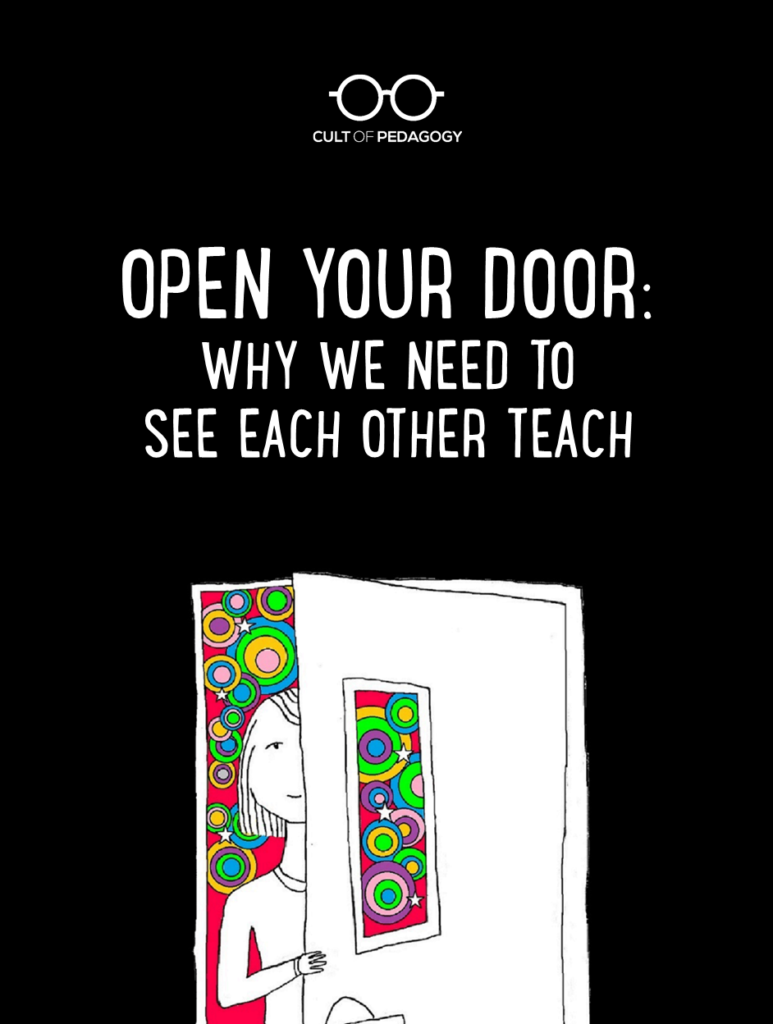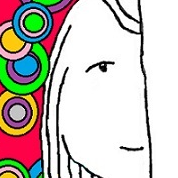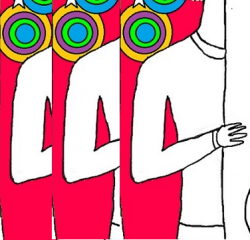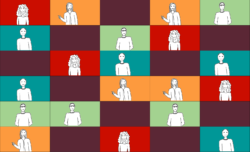
I have always taught with my classroom door closed. Officially, it’s because I have trouble with distractions, which is not a lie: Just ask my family how often I yell for quiet when I’m trying to figure out my next Quirkle move.
The unofficial reason is that I don’t really want other people watching me teach. Alone with my students, I’m a different person: I let my guard down in a way that I never do with co-workers, even people I’m comfortable with. My students get the most relaxed, funniest side of me, the side I’m not sure my colleagues would appreciate or approve of. It’s not that I do anything inappropriate – not really, anyway – but I am definitely more likely to say “booger” and “crap” when my door is closed. For that reason, I’d rather not have guests in my room.
Apparently I’m not alone. In my sixth year of teaching, our principal wanted us to learn strategies that were just being introduced by Marzano and company. Everyone got a copy of the book, we had meetings where the strategies were explored, and we collaborated on how to implement them into our lessons.
Oh, and he also wanted us to observe each other using the strategies in our teaching.
People FREAKED OUT. Not about having to read another book or try new strategies. It was the peer observation. Lost their ever-loving minds. “I don’t want someone else in my room looking for mistakes!” They said, all in a tizzy. “And I don’t want to be the observer either! Who am I to tell someone else what they’re doing wrong?”
Eventually, because it was mandated, they had to get over it. But their initial response showed a lack of understanding for how truly amazing peer observation can be. If we can get past the discomfort, opening our doors to other teachers can be a fantastic source of professional development.
Here are some reasons why:
Reason 1: Seeing Each Other Succeed
Because teaching is such a complex act, the variations in how we do it are endless. We discipline differently. We set up our space differently. We perform strategies in different ways. It’s highly likely that someone else in your building is better at something than you are. By watching the way our colleagues teach, we pick up tricks and techniques that we can take into our own rooms.
On the receiving end, there’s something really satisfying about having a peer notice something you’re doing right. In our work, we rarely get positive feedback on the things we try so hard to perfect. I have definitely never had a student approach me after class and say, “Girl, that anticipatory set was off the hook!” The teachers in my school asked, “Who am I to tell someone else what they’re doing wrong?” And here’s my answer: You are experts. You are experts because you have been there, tried that, had the same struggles. So many people don’t understand what it’s really like to be a teacher. But you do. That’s your expertise. Put a state senator in my class, have him compliment me on incorporating the Common Core in my lesson. Nice, but doesn’t mean a whole lot. Now, a compliment from you? You know. You tell me you liked the gesture I used to illustrate a difficult concept? That’s gold to me. Your feedback means more. So how about we all start holding our own opinions in higher esteem, okay?
Finally, there’s the bonding: Watching another person deeply involved in the work they’re trained for helps you get to know them on a completely different level. And though we work together, we usually follow parallel, rather than intersecting lines. We rarely ever actually see each other teach. And it’s a shame, because every time I’ve observed a colleague, my admiration for them has grown, and each time, I felt a little closer to them. This is something we could use more of in every workplace — educational or not.
Reason 2: Seeing Each Other Fail
How can seeing each other fail be a positive? To start with, we return to the subject of bonding.
The hardest part of letting other people watch you teach is the possibility that you’ll screw up. Then you’ll be embarrassed. Because of this fear, we think we should postpone observations until we are super-prepared, until we have the perfect lesson ready to go.
Here’s the irony in that: You being perfect makes other people hate you a little, and themselves a lot. Or maybe it’s the reverse. Anyway, achieving something close to perfection is pretty damaging in a lot of ways. Conversely, letting people see some of your flaws creates greater intimacy. It makes them realize that their own flaws are not so weird. When I go over to someone’s house and it’s spotlessly clean, I feel kind of jealous and insecure. But crumbs on the counter and shoes in the hallway? On a gut level, I’m more comfortable. In this place, my psyche tells me, I won’t be judged. The same goes for your teaching: If you let someone else see you screw up, they will probably be more comfortable having you observe them. What happens next is you both start to take more risks, try new things. You cultivate a spirit of experimentation and learning together, rather than struggling to out-perfect each other.
Apart from the bonding aspect, failure can lead to constructive criticism, which will help you grow. Someone once said that the real benefit of marriage is having someone in your life who will regularly call you on your crap, who will hold up a mirror so you can face your flaws and outgrow them. In our work, we can do for each other what spouses do on their good days: Gently point out areas for improvement and support each other through the growing pains.
Reason 3: The Intangibles
Every time I observe another teacher, I discover something I’m not even looking for. In my first year, I spent one class period observing Sue, another 6th grade language arts teacher. I was there to see how she conducted a writer’s workshop, but something else she did made a much bigger impression on me.
That first month, I obsessed about establishing order in my classroom: I thought I had to have them all in their seats when the bell rang, pencils sharpened, quiet, ready to learn. If I told them to take out their writing folders, they should have them out and ready in less than 20 seconds. But every time, three or four kids would just drag through the process, or they’d get off-task, or they wouldn’t hear me at all, lost in daydreams. None of the precision I was hoping for. And I got tense about it. I scolded and nagged. And I felt insecure, like less of a teacher, the only one the kids didn’t respect.
So there I was in Sue’s class, and the first thing I noticed was that when she told them to get their writing folders out, they moved slowly, too. And one kid got up and sharpened his pencil, even though they should have already done that. And another one walked up to Sue to ask her something privately – another aberration in the plan! – and through it all, she just sat on her stool at the front of the room, mellowed out, waiting. For me, this was nothing short of a miracle. I had never considered not freaking out to be an option.
So much of what we gain from watching each other teach falls into this “intangible” category: attitudes, pacing, small calibrations that make things work a little better. And it happens especially when you observe people who teach the same students you teach. If you are in elementary, go along with your students to specials every now and then and see how that teacher deals with them. In middle school, arrange to have your class covered on a test day so you can observe someone else on your team. Seeing your students with another person gives you ideas you never would have come up with on your own.
Bonus: A United Front
Lastly, there’s one more beneficial side-effect that comes from peer observation: having your students see you together. Something powerful happens when students see their teachers together. You become larger than the sum of your parts, stronger not only in number, but because this simple show of cooperation tells them you are united, which is an important message to send to kids. In the same way that children feel more secure when their parents are getting along, students feel something similar when they see us support each other.
This principle applies all the way through college, and could be more significant at that level. Adult students may be more likely to challenge their instructors, perhaps because there’s less of an age difference, or because their life and work experience could result in a lack of innate respect for your position. The occasional presence of another professor or instructor in the room reminds students you are part of a larger group that has some authority, that others have your back.
Getting Started
You don’t have to wait for your school to set up a formal system of peer observation to start watching other teachers. In fact, the more spontaneous visits often yield the most interesting insights. Ask another teacher if you can grade papers in the back of his room during your planning period. Or if time is short, just come in for the first fifteen minutes.
And let your peers know your door is open. Some schools have instituted a “pineapple welcome” program, encouraging teachers to occasionally hang a picture of a pineapple — a traditional symbol of welcome — outside their doors, to let peers know it’s a good time to drop in. (Update: This system has now evolved into something even better. Read about Pineapple Charts now!)
To make observations go more smoothly, consider these tips: Decide ahead of time if feedback will be given. Some people are more likely to let you observe if you’ve agreed in advance that you won’t offer any commentary on what you see. Sure, they won’t grow from that arrangement, but it’s a step some people need to get more comfortable with the process. If you have agreed to provide feedback, always start with positives. When you do offer criticism, just point out one or two very specific things, and be descriptive rather than judgmental: When you did ______, these students did _______.
And be cautious about participating. It’s tempting sometimes to pipe up with a comment – after all, you’re likely one of the most engaged people in the room – but resist that urge and wait to be invited. I’ve seen teachers who overdo this and end up hogging all the airtime to the detriment of the students.
* * *
I still prefer to teach with the door closed, because cutting out distractions is high on my list of needs. And if it’s important to you, by all means keep yours closed too, but close them only in the literal sense. You can have an open-door policy and still have a closed classroom door: Just let your peers know when they are welcome.
Ours is a delicate, nuanced art, and though books and workshops offer all kinds of interesting ideas for how we can improve that art, the resources that lie behind every door in your school can offer something even richer, if you’re brave enough to let each other in. ♥
If you liked this one, I’d love to have you come back for more. Join my mailing list and get weekly tips, tools, and inspiration — in quick, bite-sized packages — all geared toward making your teaching more effective and joyful. To thank you, I’ll send you a free copy of my new e-booklet, 20 Ways to Cut Your Grading Time in Half. I look forward to getting to know you better!









Hi again Jennifer,
I am really enjoying this site. (I just left you a message on the National Board Certification portion of this site). I am in the process of setting up a peer observation with a colleague of mine for next week. I have also had a new teacher observe me this year. I agree that it is so important and can be very rewarding!
Thanks so much, Christine. I feel pretty strongly about this particular article, so I’m glad you got something out of it. Teachers can be secretive and competitive with one another, but we have so much to share. I hope this helps make your upcoming peer observation even better!
This is a must read article. Many teachers including myself do not enjoy observation done by peers because of lack of trust on what the information gathered may be used for.
I shared the link to this article with my colleagues!
I was on the site and happened across this one. Timeless!!
I just challenged every teacher in my building to observe another teacher before our winter break. I’m not sure what the reward for the challenge will be, but I have time to think about that. I was thinking I would put up a bulletin board somewhere and have them post something positive they gained from the experience.
YES. Love the bulletin board idea. Come back and tell me how it goes!!
As part of our appraisal system, our school instituted peer observations last year. We have to invite another teacher to our classroom once a semester to observe our lesson. I feel that so much can be learned from this, but the form they gave us was horrible. It was just a checklist of “observed/not observed” characteristics. In my feedback this year I asked for the form to be revised, because I don’t feel that it is helpful for my own teaching. Do you have a form that you used for peer observations?
I don’t have one on hand, but that does sound pretty awful, Sharee. It sounds like they are trying to keep the observations as neutral as possible, maybe to lower people’s defenses? If I were to create a form for this, I would keep it pretty simple, asking observers to
If and when the staff is ready, you might also add a place for one suggestion for improvement.
I’ll keep an eye out for a good one. If I find it, I’ll link to it here.
One more thing to consider — when people come to observe you, you can always ask them to write down a few other observations they can give you apart from the form.
Let me know how things work out next year!
Your article makes for great reading and one that the skeptics should read. Having a form to take notes however, might not be a good idea for many teachers. It might look like a formal appraisal, which I know Teachers’ Unions will object to. At my school, we do quite a bit of co-teaching and so we sometimes have another teacher in the room. I find that sometimes just the moral support of a colleague in the room can be rewarding.
I would also love to have a motivating, easy and proactive peer observation form just to keep track of the observations and to pin point the good techniques and as a reference for
posible feedback. I’ll be working in one to work in my school – I’m the headmistress. As soon as I have it I’ll share it with you.
Hi there…we started a district wide peer observation system with a district check off list. Something they purchased from a publisher on how to gauge the effectiveness of the implementation of common core standards. 1-2 minute walk through just checking off if people were doing certain things the district thought important. It’s supposed to be pull out with a sub to visit 7 or 8 classrooms in 90 minutes with 2 other staff members then some site admin had staff do it on their breaks or lunches. Then the union got involved and put a stop to that but some teachers still do because they’re intimidated to be quiet. Prep at elementary I’m saying? Oh what’s that?! We have 30 minutes a week. Yea…it’s one thing to observe teachers of your choice AND to observe a lesson YOU choose…it’s another top down example here. The norm on policy is what’s done TO teachers not done WITH them yet we know what WE need. Of course when was the last time anyone ever asked teachers what they needed?
Which is the Marzano book that you mentioned at the beginning?
Texi, it’s Classroom Instruction that Works.
This was a powerful read for me. I am a teacher-blogger and so it would seem that opening the door would be so easy. But it’s not and you summed up how I feel exactly! I’m not shy. FAR from it, but I don’t enjoy the censored version of myself with another adult in the room. I go from being the “I Love Lucy” dynamic teacher that I am, to some kind of version of myself where I trip on my own feet and mispronounce words. But I am not shy- just not in love with experiencing criticism/cynicism. None of us like that. But only a real creeper of a teacher/admin would dish that out, so I’m going to let go. I think this is a little silly of me and I’m going to work on it.
participation & involvement is more important than observation/ getting teachers involved with other teachers is great but not on a level of observation & judgement
THANK YOU for your brave ideas here. I am a coach, and when I do demos, I always say “This is me going first; then you can keep this momentum going. Think about it as embracing PUBLIC practice, not perfect practice.” I promise to use your great ideas when I celebrate the beauty of shared observation!
A great article! I shared this at a mentor meeting and we had great conversations around it. Thank you!
Observing each other is a very powerful tool that can help us to improve our craft. I have the privilege of watching teachers teach since I am an instructional coach. I am blown away by some of the amazing learning experiences our students are receiving.
I have always liked the idea of having my colleagues around to bounce ideas off of and see their point of view on things. I really enjoyed reading your article.
This is quite interesting. Never saw it in this light though its something I’ve been doing for quite a while.
I’m a new teacher and I teach casually at the moment. Being so new I feel that I can sometimes underestimate my abilities and therefore lack confidence. I often close the door when teaching. I find that whenever the door is opened by another teaching to ask something I feel myself tense up. I have even felt myself get stricter when there is another teacher present; this is something I don’t really like myself doing. I love the idea of learning from each other and learning to be comfortable with another teacher present. I really appreciate this post and I hope to open my classroom door bit by bit until it is always open.
Hey Ginny,
I read your comment, and I think you just described a ton of teachers! I think it’s pretty normal to feel vulnerable when colleagues are around. I was always incredibly comfortable in front of my kids, but when someone walked in, I found myself getting in my head. Rather than staying in my element and remaining focused on the kids, I sometimes wanted to make sure visitors saw something great. That didn’t work so well, because the little voice inside started talking: “They’re watching me. They’re listening to me. And they either like or don’t like what I’m doing.” I hated that. It threw me off. Things really changed for me when I just trusted that whatever was happening in the classroom was ok…people weren’t coming in to see “me.” And even if they were, that was ok too. They were either going to see something really great, or not. Either way, I’d still be doing what I always do — reflecting on what worked so well that I was bursting to share it others. Or reflecting on what wasn’t going so great, and figuring out what to try differently next time. Being vulnerable can be scary…it’s also the catalyst to great growth.
Thank you Jennifer. Very insightful.
I have asked our teachers to do peer observations/learning walks for the past four years. Our staff has commented it is the beat PD opportunity provided them. In two weeks we are doing a learning walk exchange with the other two middle schools in our district to “branch” out. Your insight is spot on for the importance of doing this.
Overall I love this post and hope more school administrators have learned from reading this than teachers. As I shared in my brief twitter posting I have been the victim of the opposite intended outcomes here. First and foremost we hear so much about learning from each other and collaboration that I want to share in my most successful and fruitful instances I found that when it happened organically was the most sustainable and beneficial. Two catalysts for that were my existing relationships with several of my former colleagues and a desire to simply do more for each other as well as our students than accept the status quo. One example, was when I worked together on a number of comprehensive projects (inquiry, project-based, hands-on, and student-centered) with my friends in the math, social studies, SPED, and Science departments. We didn’t formally plan anything we were just sitting at lunch together and literally said, “We should do something fun together since we all share the same students.”
But, as always seems to be the case in my career, there was another side. First let me share a critical detail that having looked back at my entire career in the classroom and the colleagues that I had explains much of what I am about to share. At my last school, as with all the schools I worked at, I was the only African-American male teacher. A major by-product of this and a majorly dysfunctional culture on campus created the debilitating conditions that ultimately let me no choice but to leave the classroom. In the process of having an open door for teachers to learn from each other I found that jealousy, biases, and downright racism were the primary motivators of many. Instead of seeing the successes there was a more purposeful effort to see the “failures.” While the failures should have served as a learning opportunity for growth they were instead used as a punitive measure against me and by reporting certain “failures” to the principal the attempts were more to gain favorable deference. This in turn left me on edge every single time my class was to be “observed” by colleagues I knew were not trustworthy. The intangibles many of us would identify as good, such as taking time to chat with students during class to make sure their needs were met, was instead used as ammunition for “being too friendly with the students and not teaching them.” My classroom was often non-traditional as students would be working on different projects based upon their pre-identified skills and growth models we established together at the start of each project (which included grade negotiations). Rather than this being seen as an equitable learning environment in which all students needs are being met it was used as a failure that the class was disorderly and I lacked control. The worst part is I would observe other classes in which similar, but not the same, environments existed and those teachers would be praised. In one instance a quiet and compliant class was seen as the model to the point the teacher was nominated by the wealthy parents for teacher of the year. Of course her classes were not only as homogeneous as you could get, but she never worked with any of the students I had and thus didn’t need to adjust her learning environment.
In the end, I think this post is a great model for thinking and ideally shifting towards a more cohesive and collegial environment. There is tremendous value in teachers working together under the conditions you mentioned, but if I saw a teacher at a school that looked like me and they said they are the only one like I was, I would strongly advise against doing this for the reasons I have shared and many other race and culture reasons.
Ken, thank you so much for sharing this perspective. I wrote this post with a generally positive, supportive culture in mind, but you’re right: Teachers in less than supportive school environments should probably be more cautious about who they let into their space. I’m so sorry you had to experience this and I hope you’re in a better place now.
This is such a great idea Jennifer! I never really liked the observation aspect of it, but grew to love it when I was working in Singapore years ago for an Australian University. At that university, I admit, I think I grew so much as a teacher because of the initial system that was put forth/implemented by the initial Australian franchise in the first place. In this system they made, not only did we have regular peer assessments (twice a year) I believe, but we also had a yearly observation by the centre manager once a year complete with detailed feedback on how to improve on your course delivery too and one PD session every 10 weeks for about 2 hours before a group lunch. In addition to this, because we had two separate shifts, for the academic courses, we usually would ask a teacher to come in and help moderate a presentation from a few students. On top of this, we were also required to help moderate 2 essays that were handed to another teacher and vice versa. This continuous system somehow worked and really made the dynamics within our teaching team stronger.
This being said, peer observation was something I dreaded, but also appreciated at the same time, because as much as I hated being observed, I simply loved going into other teachers rooms and seeing how they conducted their classes. In this regard though, I’d also like to highlight that this doesn’t always go according to plan. If you do decide to go, please do remain professional as an observer. There was this one time where I had 2 fellow teachers observe me, and as our manager had stated, to pass them sheets with criteria on which you would like to be observed for. I photocopied from a list what was needed a week earlier and left it at that. Well, when the day came, both of these teachers felt that it was a waste of time, and decided not to bring the piece of paper. When I inquired further, one of them said that they had lost it while the other had no idea where she had even put it! My stress levels were already up and this just added to it. I ended up having to run around and photocopy the sheets for the teachers and the lesson didn’t end up being as smooth as I would have liked it to be. Lesson: please be mindful of your own actions and how they could potentially have a domino affect on others.
I love your writing so much, Jennifer. Everything you post has a base in humanity, vulnerability, and kindness. Plus you give teachers credit for the intensely nuanced skills required to be effective. I appreciate your work very much.
Lisa,
Thank you for your positive feedback! I’ll be sure to share this with Jenn.
Peer observation was the best thing that ever happened to me as a teacher. My first year, my classes were out of control, my lessons were terrible, and I had a me vs. them mentality with my 7th graders, for the most part. Consequently, my first evaluation was horrible and the worst part was that I had no clue why. So I asked another teacher to come watch me in her off period. She came in and gave me the BEST ideas ever. She didn’t mince words – it was too bad for coaching, I had no schema. That one single class period changed my life!
Wow! This is awesome, Michelle!
Interesting read!
Well said. Lots of best practices here..